Notice

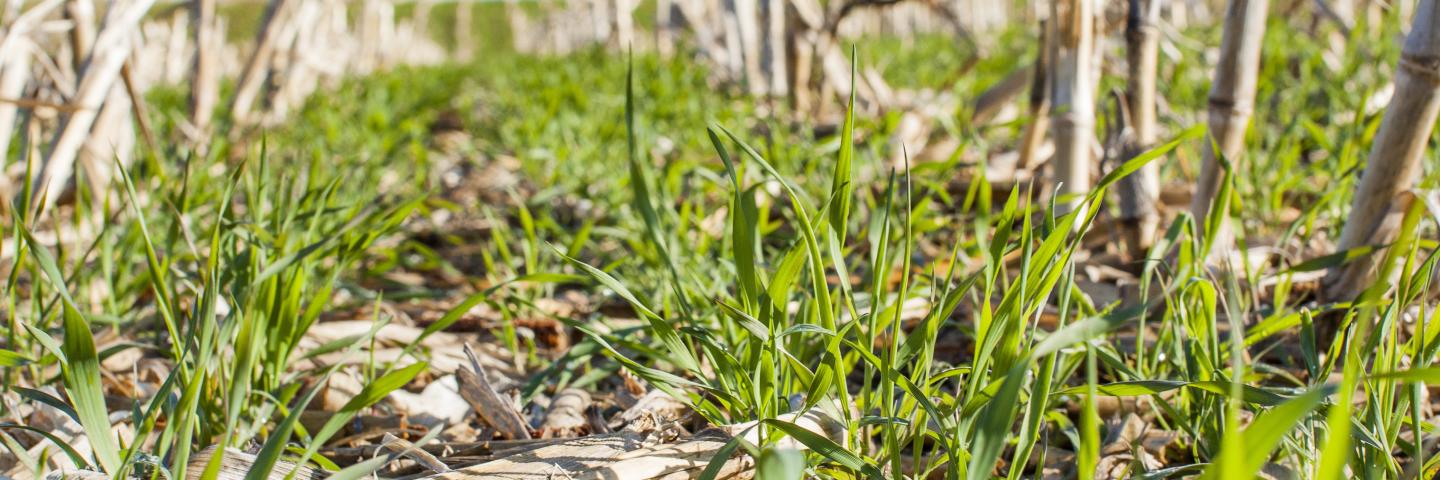
The Environmental Quality Incentives Program (EQIP) provides financial and technical assistance to agricultural producers and non-industrial forest managers to address natural resource concern
EQIP delivers environmental benefits such as improved water and air quality, conserved ground and surface water, increased soil health and reduced soil erosion and sedimentation, improved or created wildlife habitat, and mitigation against drought and increasing weather volatility.
How It Works
This voluntary conservation programs helps producers make conservation work for them. Together, NRCS and producers invest in solutions that conserve natural resources for the future while also improving agricultural operations.
Through EQIP, NRCS provides agricultural producers and non-industrial forest managers with financial resources and one-on-one help to plan and implement improvements, or what NRCS calls conservation practices. Using these practices can lead to cleaner water and air, healthier soil and better wildlife habitat, all while improving agricultural operations. Through EQIP, you can voluntarily implement conservation practices, and NRCS co-invests in these practices with you.
Benefits
Some of these benefits include:
- Reduction of contamination from agricultural sources, such as animal feeding operations.
- Efficient utilization of nutrients, reducing input costs and reduction in nonpoint source pollution.
- Increased soil health to help mitigate against increasing weather volatility and improved drought resiliency.

Learn about different types of conservation issues that might impact the productivity or natural resources on your farm, ranch, or forest by exploring the topics below.
New Jersey NRCS FY 25 EQIP Funding Opportunities
New Jersey will be using the ACT NOW process in FY 2025 for AMA, EQIP and EQIP IRA to immediately approve and obligate a ranked application in a designated ranking pool when the eligible application meets or exceeds a State determined minimum ranking score without waiting until the NRCS field office ranks all applications in that ranking pool. When using ACT NOW, the State must post the threshold ranking score for any ACT NOW ranking pool to the website. Applications meeting the threshold and above will be funded as they are ranked and submitted.
EQIP Initiatives
Targeted EQIP financial assistance is available through several programmatic and landscape conservation initiatives.
Aquaculture Initiative
The Aquaculture Initiative offers technical and financial assistance to New Jersey aquaculture producers to address excessive bank erosion from streams, shorelines, or water conveyance channels, excess nutrients in surface and groundwater, degraded plant conditions, fish and wildlife habitat degradation, and inefficient energy use from equipment.
Beginning Farmer
The primary focus of this funding pool is to assist beginning farmers with addressing resource concerns on their operations.
Conservation Activity Plans
EQIP financial assistance is available for the development of Conservation Activity Plans (CAP). A CAP can be developed for producers to identify conservation practices needed to address a specific natural resource need. Typically, these plans are specific to certain kinds of land use such as transitioning to organic operations, grazing land, forest land, or can also address a specific resource such as nutrient management. All Conservation Activity Plans are developed by a certified Technical Service Provider (TSP) to help agricultural producers and forest owners address specific natural resource concerns on their land.
Conservation Incentive Contracts
Conservation Incentive Contracts focus on Climate-Smart Forestry and Agriculture and Drought Resilience management practices. EQIP-CIC provides financial assistance to adopt conservation activities on working landscapes. Through five to 10-year contracts, producers manage, maintain and address important natural resource concerns and build on existing conservation efforts.
High Tunnel Initiative
This Initiative helps with cost of installing a high tunnel in order to extend the growing season and improve plant condition for high value crops. High tunnels protect plants from severe weather and allow farmers to extend their growing seasons – growing earlier into the spring, later into the fall, and sometimes, year-round. And because high tunnels prevent direct rainfall from reaching plants, farmers can use precise tools like drip irrigation to efficiently deliver water and nutrients to plants. High tunnels also offer farmers a greater ability to control pests and can even protect plants from pollen and pesticide drift.
NRCS and producers develop Agricultural Energy Management Plans (AgEMP) or farm energy audits that assess energy consumption on an operation. NRCS then uses audit data to develop energy conservation recommendations.
The organic initiative provides financial assistance to help implement conservation practices for organic producers or those transitioning to organic.
Socially Disadvantaged Producers
The primary focus of this funding pool is to assist socially disadvantaged producers with addressing resource concerns on their operations.
The Working Lands for Wildlife Initiative (WLFW) focuses on combating the decline of wildlife species whose decline can be reversed. Each state targets habitat improvements for selected species to help reverse the species decline and benefit other species with similar habitat needs as well. New Jersey NRCS works in partnership with the U.S. Fish and Wildlife Service and other agencies and organizations to select target species for WLFW.
Local Priorities set by Local Work Groups
Funding is allocated to fund conservation activities that address resource priorities set by North, Central and South Jersey Work Groups. Applications for this fund pool are ranked according to resource priorities that have been identified by the respective local work group. Typically, these resources relate to management of Cropland, Forest Land, Livestock, and Wildlife Habitat.
Northern New Jersey Local Work Group
This fund pool directs EQIP funding to conservation activities in Bergen, Essex, Hudson, Hunterdon, Morris, Passaic, Somerset, Sussex, Union, and Warren Counties. It seeks to prioritize applications that address natural resource issues relating to improving water quality, livestock, forestry, and wildlife.
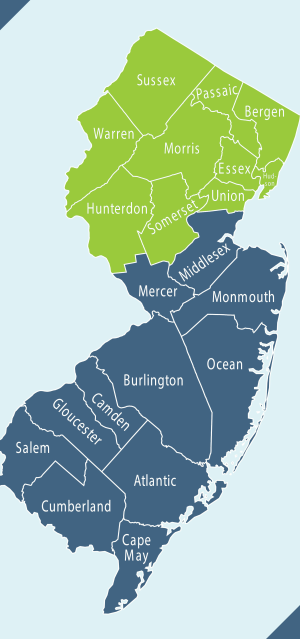
Central New Jersey Local Work Group
This fund pool directs EQIP funding to conservation activities in Burlington, Camden, Mercer, Middlesex, Monmouth, and Ocean Counties. It seeks to prioritize applications that address natural resource issues relating to soil quality, water quality and pollinator protection, as well as livestock and forestry.
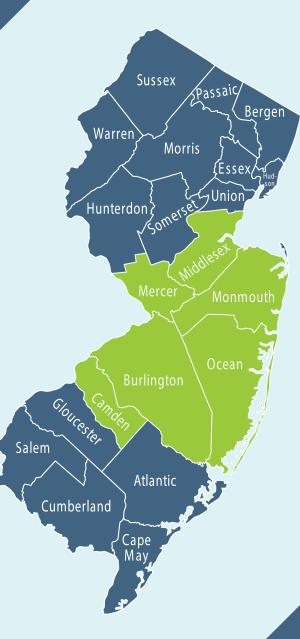
Southern New Jersey Local Work Group
This fund pool directs EQIP funding to conservation activities in Atlantic, Cape May, Cumberland, Gloucester, and Salem Counties. It seeks to prioritize applications that address natural resource issues relating to reducing soil degradation, improving irrigation efficiency and increasing resilience of coastal communities as well as forestry and livestock.
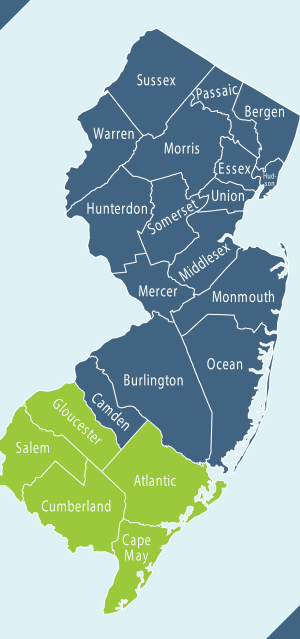
National Water Quality Initiative
NRCS will help producers implement conservation and management practices through a systems approach to control and trap nutrient and manure runoff. Qualified producers will receive assistance for installing conservation practices such as cover crops, filter strips and terraces in the Upper Cohansey River and Upper Salem River Watersheds to address documented phosphorus, bacteria, and sediment impairments which may be caused by soil erosion, exposed soil, and lack of riparian buffers and filter strips.
Additional Information
Apply for Environmental Quality Incentives Program (EQIP)
The Environmental Quality Incentives Program (EQIP) provides financial and technical assistance to agricultural producers and non-industrial forest managers.
Learn MoreHistorically Underserved Farmers and Ranchers
The Agriculture Improvement Act of 2018 (2018 Farm Bill) includes provisions that address socially disadvantaged, beginning, limited resource, and veteran farmers and ranchers (“historically underserved producers”).
Learn MoreFarm Bill
The 2018 Farm Bill was enacted on December 20, 2018. The Farm Bill continues its strong support for conservation efforts of America’s farmers and ranchers through reauthorization and expanded flexibility of NRCS conservation programs.
Learn MoreReady to get started?
Contact your local service center to start your application.
How to Get Assistance
Do you farm or ranch and want to make improvements to the land that you own or lease?
Natural Resources Conservation Service offers technical and financial assistance to help farmers, ranchers and forest landowners.
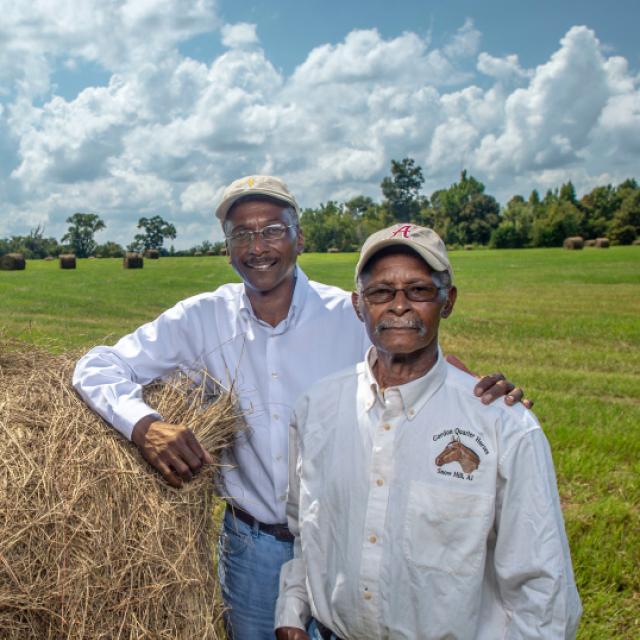
To get started with NRCS, we recommend you stop by your local NRCS field office. We’ll discuss your vision for your land.
NRCS provides landowners with free technical assistance, or advice, for their land. Common technical assistance includes: resource assessment, practice design and resource monitoring. Your conservation planner will help you determine if financial assistance is right for you.
We’ll walk you through the application process. To get started on applying for financial assistance, we’ll work with you:
- To fill out an AD 1026, which ensures a conservation plan is in place before lands with highly erodible soils are farmed. It also ensures that identified wetland areas are protected.
- To meet other eligibility certifications.
Once complete, we’ll work with you on the application, or CPA 1200.
Applications for most programs are accepted on a continuous basis, but they’re considered for funding in different ranking periods. Be sure to ask your local NRCS district conservationist about the deadline for the ranking period to ensure you turn in your application in time.
As part of the application process, we’ll check to see if you are eligible. To do this, you’ll need to bring:
- An official tax ID (Social Security number or an employer ID)
- A property deed or lease agreement to show you have control of the property; and
- A farm number.
If you don’t have a farm number, you can get one from USDA’s Farm Service Agency. Typically, the local FSA office is located in the same building as the local NRCS office. You only need a farm number if you’re interested in financial assistance.
NRCS will take a look at the applications and rank them according to local resource concerns, the amount of conservation benefits the work will provide and the needs of applicants. View Application Ranking Dates by State.
If you’re selected, you can choose whether to sign the contract for the work to be done.
Once you sign the contract, you’ll be provided standards and specifications for completing the practice or practices, and then you will have a specified amount of time to implement. Once the work is implemented and inspected, you’ll be paid the rate of compensation for the work if it meets NRCS standards and specifications.

